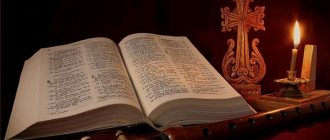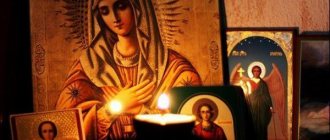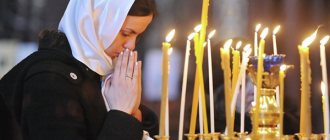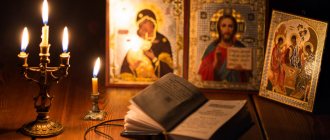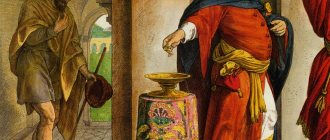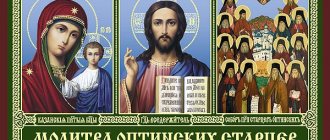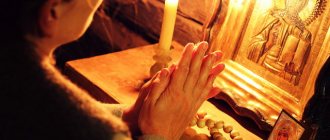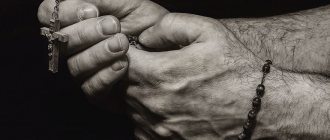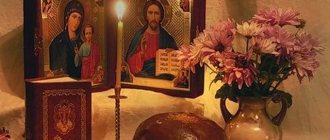TO HOME PAGE
TO THE “TEXTS” PAGE
STATUTES OF THE MONACY CELL RULE
According to the Followed Psalter, before the beginning of the rule, seven short prayers are read (see p. 565). Next: Compline, canons (Canons and akathists, which are included in the rule, in monasteries are read at Compline, and kathismas, prostrations and prayers are performed in the cell), four kathismas with troparions and prayers, prophetic songs, 300 prostrations, 600 Prayers of Jesus and 100 to the Mother of God .
Novice and weak monks were allowed to read three kathismas, then perform 100 bows, 300 Jesus Prayers and 100 to the Mother of God. In some ancient monasteries this rule was followed in full, except for the reading of nine prophetic songs according to the Psalter. The Psalter also indicates that there is a practice of reading 12 psalms during the rule of the Order.
Charter of the Florishcheva Hermitage
In the Florishcheva Hermitage, founded in the 17th century in the Vladimir province by St. Hilarion, Metropolitan of Suzdal, he introduced the following rule, divided in time into three parts.
At Compline, the canons to the Sweetest Jesus, the Mother of God and the Guardian Angel and the akathist to the Mother of God were read. After some time, the brethren performed the rule in the temple.
In addition to the seven short prayers read at the beginning of the rule according to the Psalter, the saint introduced appeals to various saints and entire ranks of saints, as well as seven prayers compiled by the holy fathers. Then 300 prostrations, 600 Jesus Prayers and 100 to the Mother of God were performed (which corresponds to the rule in the Psalter) according to the following order: exclamation, the usual beginning of the “Our Father”, Psalm 50, the Creed, 30 prostrations with the Jesus Prayer (together all the brethren ), after this, standing, in a whisper or with the mind, they read 70 Jesus Prayers, “Glory even now,” Hallelujah, Hallelujah, Hallelujah, “Glory to Thee, O God” (three times, with bows to the ground) and again made 30 bows to the ground, etc. , with the reading “Glory and now” after every hundred prayers (sotnitsa - Sotnitsa - 100 mental prayers performed using the rosary.).
Then they read the Memorial with bows according to the Psalter, Worthy, Trisagion, troparia “Have mercy on us. Lord, have mercy on us”, “Lord, have mercy” (40 times). The most honest, “God, show mercy to us” and the prayer of St. Ephraim the Syrian “Lord and Master of my life” with bows to the ground, “Virgin Mother of God, rejoice” (three times, with bows). Most honest and leave. Then - the usual mutual forgiveness of the brethren.
After that, the brethren read the Psalter in their cells. Beginners - 3 kathismas, intermediate - 4 kathismas, perfect - 7 kathismas. Those who could not fulfill this had to read “Our Father” in the cell 30 and 50 times with bows or more. In addition, they read with bows “Rejoice to the Virgin Mary” (novice 50 times, average 100 times and perfect 150 times and more). For the weak and young, this cell rule was abolished.
Subsequently, the rule of the Florishcheva hermitage was borrowed by the Sarov monastery, but in a somewhat abbreviated form. From the Sarov Hermitage, the cell rule passed to the Novgorod Yuryev Monastery with a reduction in the beginning and end of the rule, but an increase in the canons at Compline, with the addition of canons for the seven-week saints.
In different monasteries, hundreds of mental prayers were performed in different numbers and at different times of the day: in the morning after sleep, in the evening after dinner, or at midnight.
The diversity in the implementation of the cell rule occurred because the rule given in the Psalter is difficult for many to implement, it is stated briefly and vaguely, which gave rise to different understandings and interpretations. The Psalter states that the full rule is not necessarily for everyone and is shortened for the weak and beginners. In the monasteries, much regarding the cell rule was left to the will of the abbots, confessors and elders guiding the novices. Therefore, differences in the cell rules of monasteries are acceptable.
Charter of the monasteries of Sarov and Yuriev Novgorod
According to the Sarov Rule: after Compline, without leaving the church, the brethren listened to the evening rule with three canons: to the Sweetest Jesus, to the Most Holy Theotokos with an akathist and to the Guardian Angel.
According to the Yuryevsky Rule: at the end of Compline it is necessary to perform certain canons (in the Followed Psalter), namely: on Saturday evening the canon to the Lord Jesus Christ, to him the irmos: “Helper and Patron”; paraklisis to the Mother of God, canon to the Guardian Angel. Then “It is worthy to eat”, the Trisagion according to the “Our Father”, the usual troparia and the prayer: “Undefiled, unblasphemous”, “And give us, Lord” and dismissal (centurions were not supposed to be on Sunday).
On other days
On the evening of the week (Sunday) the same canon to the Lord Jesus, Paraklisis to the Mother of God, also irmos to him: “I passed through the water”; the troparion: “We contain many misfortunes”; the canon to the Archangels and then bows (i.e. five hundreds, as shown below) and so on.
On Monday evening, the same canon to the Lord Jesus, paraklisis to the Mother of God, canons to St. John the Baptist and Guardian Angel, bows and so on.
On Tuesday evening, the same canon to the Lord Jesus Christ, the canon to the Mother of God Hodegetria and the Guardian Angel, bows and so on.
On Wednesday evening the same canon to the Lord Jesus, paraklisis to the Mother of God, the holy Apostles and Guardian Angel, bows and so on.
On Thursday evening there is a canon to the Life-Giving Cross, an irmos to it: “I will open my mouth,” paraklisis to the Mother of God and the Guardian Angel, bows, etc.
On Friday evening there is a canon for the Sweetest Jesus, and an irmos for him:
“In the depths of the bed sometimes”; Akathist to the Mother of God urgently, canons to the Guardian Angel and All Saints, bows, etc.
Five hundred cell rule
God, be merciful to me, a sinner.
God, cleanse my sins and have mercy on me.
Lord, who created me, have mercy.
Without number of sins, Lord, forgive me.
My mistress. Most Holy Theotokos, save me, a sinner.
Holy Archangels and Angels and all saints, pray to God for me, a sinner.
My holy Guardian Angel, save me from all evil.
Removed from the apostle or reverence father or martyr (name), pray to God for me.
Then the hieromonk said the exclamation: “Blessed is our God,” the reader: “Amen. Glory to Thee, our God, glory to Thee.” "King of Heaven." Trisagion according to “Our Father”, “Lord, have mercy”, 12.
"Glory even now." “Come, let us worship” (three times). Psalm 50. “Have mercy on me. God". “I believe in One God” 2.
Then, according to the Sarov charter, the reader (according to Yuryevsky, the rector), standing in the middle of the temple, began to make 30 prostrations. Having said the prayer out loud: “Lord Jesus Christ our God, have mercy on us,” he bowed down, and all the brethren were with him. Everyone read the same prayer with their minds and bowed together with everyone else. Prayer with bows was performed slowly and decorously. Each monk first said a prayer, then bowed. After performing 30 bows with prayer, after a short pause, the primate said the prayer three times out loud: “Lord Jesus Christ, Son of God, have mercy on me, a sinner”; Then, in their minds, everyone repeated the same prayer a hundred times. Then the primate proclaimed: “Glory to the Father and the Son and the Holy Spirit, now and ever and unto ages of ages. Amen. Hallelujah, Hallelujah, Hallelujah, Glory to Thee, O God" (three times). “Lord, have mercy” (three times). "Glory even now."
And again he said the prayer: “Lord Jesus Christ our God, have mercy on us,” and again made 30 bows, and then said 100 Jesus Prayers. Then - “Glory and now”, “Hallelujah” and so on.
Then again the prayer: “Lord Jesus Christ, our God, have mercy on us,” and with it they made 20 bows, and again read 100 prayers (“Lord Jesus Christ, Son of God, have mercy on me, a sinner”), “Glory even now,” "Hallelujah" and so on; then they read the prayer: “Lord Jesus Christ our God, have mercy on us,” and with it they made 20 bows. After that, we read a prayer to the Most Holy Theotokos aloud, three times: “My Lady, Most Holy Theotokos, save me, a sinner,” then in our minds we repeated the same prayer a hundred times. “Glory even now”, “Hallelujah” and so on, then they said a prayer out loud: “Virgin Mother of God, rejoice” (according to Sarovsky five times with bows, according to Yuryevsky once).
According to the rules of the Florishcheva Hermitage, after bows and mental prayers, the Memorial Book of the Psalter was read with prostrations to the ground. The Yuryevsky Charter does not mention the reading of the Memorial. After “Rejoice, Virgin Mary,” the two faces sang together with sweet singing “It is worthy to eat” and bowed. Then the Trisagion according to Our Father. Certain troparia of the canons (according to Sarovsky and Florishchevsky: “Have mercy on us. Lord, have mercy on us”). Then, according to Yuryevsky, the prayer: “Those who hate and offend us” (instead of the Memorial) and 16 bows with the prayer of St. Ephraim the Syrian: “Lord and Master of my life.” “Glory to Thee, Christ God, our hope, glory to Thee” and dismissal. Then the usual mutual forgiveness of the abbot and the brethren.
According to Florishchevsky, after “Open the doors of mercy to us” - “Lord, have mercy” 40, “The most honorable Cherub”, “God, show mercy to us” and the prayer of St. Ephraim the Syrian: “Lord and Master of my life” with bows to the ground. “Virgin Mother of God, rejoice” (three times) with prostrations to the ground. “Most honorable Cherub”, release and mutual forgiveness of the brethren.
In Sarov, after reading “Virgin Mother of God, rejoice” five times, reading from the book of St. Ephraim the Syrian, then:
“It is worthy to eat”, Trisagion according to “Our Father”. Troparia: “Have mercy on us. Lord" and so on. “Lord, have mercy” 40. Prayers: “And for every time and for every hour...”, “Lord, have mercy” (three times), “Glory even now,” “The most honorable Cherub,” “Bless the name of the Lord, father,” “ Through the prayers of the saints, our fathers”, “Undefiled, unblasphemous”, “And grant us, O Master, our future sleep.” Then they read the Memorial Book of Psalms. Then from the prayers to sleep for those coming - St. Macarius the Great to God the Father: “Eternal God and the King of every creature”, the prayer of St. Antiochus to the Lord Jesus Christ: “To the Almighty is the Word of the Father.” Prayer to the Holy Spirit: “Lord, Heavenly King, Comforter, Soul of Truth, have mercy.” Prayer to the Most Holy Theotokos: “Good Mother of the King.” Prayer to the Guardian Angel: “To the Angel of Christ, my Guardian.” “The elected governor” and so on. “Glorious Ever-Virgin, Mother of Christ our God” and so on, the prayer of St. Joannicius: “My hope is the Father.” Finally, the primate took a small dismissal and pronounced a litany. Then - mutual forgiveness of the brethren. (No mention is made of the prayer of St. Ephraim the Syrian.)
Optina cell rule
In addition to church services: Liturgy, Matins and Vespers with Compline, at which all the brethren of the monastery were sure to be present, many of them read one chapter from the Gospel daily in their cells in a row, starting from the first chapter of the Gospel of Matthew to the last chapter of the Gospel of John, and two chapters from the Apostle also in a row, starting with the Acts of the Holy Apostles and ending with the last chapter of the Apocalypse of John the Theologian; and the last seven chapters of the Apocalypse were read one per day; then the last of them was read on the same day as the last chapter of the Gospel of John. Upon completion, therefore, the readings of the entire New Testament began again from the first chapters of a new round of reading. One kathisma per day was read from the Psalter, from the first to the last inclusive. In addition, they carried out the so-called five hundred cell rule in the following order.
After three bows, usually required at the beginning of each prayer in the temple and in the cell, with prayers -
“God, be merciful to me, a sinner”;
“God, cleanse my sins and have mercy on me”;
“Lord, who created me, have mercy! Without number of sinners, Lord, forgive me.”
In the cell there was also a fourth bow, with the prayer:
“My Lady, Most Holy Theotokos, save me, a sinner.” Then came the usual beginning: “Through the prayers of the saints, our fathers. Lord Jesus Christ our God, have mercy on us.” “Glory to Thee, our God, glory to Thee.” “Heavenly King” and so on (as shown in the Sarov Rule) and up to “I Believe in One God.”
After this, they read 100 prayers “Lord Jesus Christ, Son of God, have mercy on me, a sinner.” At the first 10 prayers there is a bow to the ground, at the next 20 prayers there is a bow to the ground, at the last, that is, the hundredth, prayer there is a bow to the ground. Then a prayer to the Most Holy Theotokos, placed at the end of the morning prayers and beginning with the words: “My Most Holy Lady Theotokos.” At the end of this prayer, they bowed to the ground 4. Then they again said 100 Jesus Prayers in the indicated order with 10 prostrations and 20 bows to the ground, at the last Jesus Prayer - a prostration, and again the same prayer: “My Most Holy Lady Theotokos,” with a prostration . The third hundred was performed in the same way as the first and second.
The fourth hundred prayers were addressed to the Most Holy Theotokos: “My Most Holy Lady Theotokos, save me; sinner." Of this hundred, the first ten prayers were also performed with bows to the ground, the next 20 with bows, and the remaining 69 without bows. The last, hundredth, prayer is with a bow to the ground, and after it, also with a bow to the ground, the prayer: “My Most Holy Lady Theotokos.” Then 50 prayers: “Sent to the Angel of God, my Guardian, pray to God for me, a sinner”; at the first five prayers there was a prostration, at the next ten - at the waist, and the remaining 35 prayers - without prostrations, only at the last - a prostration, and again the prayer was read: “My Most Holy Lady Theotokos,” with a prostration. After this, 50 prayers: “All saints, pray to God for me, a sinner.” At the first five prayers, bow to the ground, at the next ten, at the waist; the last prayer - again with a bow to the ground, after which it was again read: “My Most Holy Lady Theotokos,” with a bow to the ground.
Then: “It is worthy to eat” and bow to the ground. “Glory to Thee, O Christ God” and dismissal: “Through the prayers of the saints our fathers, Lord Jesus Christ our God, have mercy on us. Amen".
On weekdays, all the mentioned bows were performed. On the days of Pentecost, polyeleos holidays, pre-celebration and post-celebration, on days when the great doxology is sung at Matins and prostrations to the ground are abolished in church prayer, they were also abolished in the cell room and replaced with bows. Also, only bows from the waist were always performed on those days when the all-night vigil was supposed to be served. In the last two days of Holy Week, throughout Bright Week and from December 24 to January 7 (Old Style), this cell rule was retained, as well as on Sundays, even if the all-night vigil was not celebrated.
Any change in the composition of this cell rule, its decrease or increase, was left to the will and blessing of the elder or spiritual father.
Cell rule of the Holy Trinity Sergius Monastery of Riga
Chapter of the Gospel and the Apostle: canon to Jesus Christ and the Most Holy Theotokos; Akathist to the Savior or the Mother of God and canon to the Guardian Angel: three kathismas and five hundreds of prayers on the rosary.
Beginning of the rule according to the Followed Psalm 6.
The beginning of the centurions: “Through the prayers of the saints our fathers”, “Glory to Thee, our God” and so on (as before Sarov and Yuryev canon 7).
After “I Believe in One God”—the first centenary:
30 prostrations to the ground with the prayer “Lord Jesus Christ, Son of God, have mercy on me, a sinner”;
70 mental prayers, standing, without bowing (for rest), with the same prayer.
Glory to this day." "Hallelujah" (three times). “Lord, have mercy” (three times). "Glory even now." “My Most Holy Lady, Mother of God, through Your holy and all-powerful prayers...” "Amen". “The most honorable Cherub...”
The beginning of the second centenary: “Through the prayers of the saints our fathers.” “Glory to Thee, our God” according to “Our Father” and the second centenary:
30 prostrations to the ground with the prayer: “Lord Jesus Christ, Son of God, have mercy on me, a sinner”;
79 mental prayers, standing, without bowing for rest, with the same prayer. “Glory and now” and so on. “The most honorable Cherub,” as after the first centenary.
The third centenary is read in the same way as the second.
Beginning of the fourth centenary: “Rejoice to the Virgin Mary” and 30 prostrations to the ground with the prayer “Most Holy Virgin Mary, save me, a sinner”; 70 mental prayers are the same.
Fifth centenary: 15 prostrations to the ground with the prayer: “Make all heavenly things, Archangels and Angels, pray to God for me, a sinner,” and 35 mental prayers of the same kind.
15 prostrations to the ground with the prayer: “Lifted to my Guardian Angel, save me from all evil and pray to God for me, a sinner”;
35 mental prayers are the same.
“It is worthy to eat,” “The most honorable Cherub,” “Glory even now,” “Lord, have mercy (three times), “Through the prayers of our holy fathers,” “Lord Jesus Christ our God, have mercy on us.”
In order to gain spiritual benefit and not to disturb health, it was advised: at midnight to perform the first centenary, then go to Matins; to do the second centurion after Matins. and the last three - in the evening, before bed, or as you wish.
On Sundays and great holidays from the Nativity of Christ to Epiphany and from Palm Week to the Week of the Apostle Thomas, the rule was completely postponed, and on the days of the Polyelean holidays and on Saturdays it was performed without bowing to the ground.
The memorial was read at will. If there was no time, it was replaced with the prayer: “Those who hate and offend us.” It was unacceptable to read the confession of sins every day when going to bed: “I confess to You, my Lord God and Creator in the One Holy Trinity.”
Then they read prayers for the future to sleep.
Charter of the Seraphim-Diveyevo nunnery
Finding the rule of the Sarov monks unbearable and difficult, the Monk Seraphim gave the daily rule taught to him by the Mother of God. When you got up in the morning, you should read: “Worthy” once, “Our Father” three times, “Virgin Mother of God, rejoice” three times. The symbol of faith, then two bows from the waist with a prayer:
“Lord Jesus Christ, Son of God, have mercy on me, a sinner,” bow from the waist with the prayer: “Lord Jesus Christ, Son of God, have mercy on us sinners”; after this, two bows from the waist with the prayer: “Lord Jesus Christ, Son of God, the Lady Virgin Mary, the Mother of God, have mercy on me, a sinner,” and a bow from the waist with the prayer: “Lord Jesus Christ, Son of God, the Lady Virgin Mary, Theotokos, have mercy on us sinners.” At the end of this rule, one must kneel and make twelve bows from the waist with the prayer: “Lord Jesus Christ our God, have mercy on us sinners,” and similarly twelve bows from the waist with the prayer: “My Lady, Most Holy Theotokos, save us sinners.” Then read morning prayers. Those who work can read this rule even on the go, while working.
Before lunch you should constantly read the Jesus Prayer to yourself, and after lunch until night: “My Lady. Most Holy Theotokos, save us."
Evening rule: read 12 psalms chosen (pictorial) by the desert fathers, then a memorial service, a sermon and make 100 bows from the waist with the prayer: “Lord Jesus Christ, Son of God, have mercy on us sinners” and one hundred bows from the waist with the prayer: “To our Lady, the Most Holy Theotokos, save us sinners." Then repeat the morning rule.
At night, you should read the same rule again and prayers for sleep for those coming.
The Mother of God forbade Father Seraphim to make reading the akathist obligatory, so as not to impose burdens and unnecessary sin on anyone’s soul.
On Sunday, the commandment was given by Father Seraphim to serve (in Diveevo) before the liturgy the Paraklisis of the Mother of God, all in chanting, according to the notes.
Then Father Seraphim ordered unforgiving confession and communion during all fasts and, in addition, on the twelve feasts, without tormenting himself with the thought that he is unworthy, “since one should not miss the opportunity when one can more often use the grace bestowed by communion of the Holy Mysteries of Christ. Trying, if possible, to concentrate in the humble consciousness of one’s complete sinfulness, with hope and firm faith in God’s ineffable mercy, one should proceed to the Holy Sacrament, which redeems everything and everyone.
TO HOME PAGE
TO THE “TEXTS” PAGE
Who are monks
Christianity spread rapidly, the strict order of life began to weaken. Ascetics retired to live in mountainous, desert areas in order to lead a strict life, far from worldly temptations. Solitary people began to be called hermits or hermits. This was the beginning of monasticism. In Russian Christianity, instead of monasticism, the term “monasticism” is used - leading a different life, not connected with the temptations of the world.
Notes
- In almost all monasteries, centurions were performed separately from the canons of Compline, and if they were performed in church, then some time after Compline or after the evening meal.
- Where the canons were not performed at Compline or who could not attend Compline, the canons were performed in the cell.
- It is better to begin the cell rule according to the Psalter.
- It is advisable to complete the centurions as shown above, according to the Sarov and Yuryevsky charters: “Glory and now,” “Hallelujah,” and so on, which was done in many monasteries.
- In the Riga Charter, “Through the prayers of the saints, our fathers” is placed after “Our Father.” This is the opening prayer of the nuns, instead of the priestly exclamation: “Blessed is our God.”
February 10, 2014 Source: Publishing Council of the Russian Orthodox Church 2007
The main goal of a monk
The goal of monasticism (monasticism) is to achieve moral spiritual strength for the sake of saving one’s own soul and the souls of all Orthodox Christians. Monasticism represents a great feat of moral service to the world. It protects the world, prays for it, prayerfully intercedes for sinful people. The main, and invaluable, goal and service to the monk’s society lies in constant prayer for the Church, for the fatherland, for living and dead Christians. As Saint Theophan the Recluse said: “Monks are a sacrifice to God from society, which, handing them over to God, makes them its own delight.”
The presence of monks and monasteries in the country shows the moral strength of the Orthodox folk spirit. Russian people have always loved monasteries. If a monastery was created somewhere, they settled around it, a village arose, which often grew into a large city. An example of this is Sergiev Posad, Kirillov, Suzdal and other cities.
What is the essence of monasticism
Monastic life presupposes a strong inner desire to move away from the blessings of secular life and to completely surrender to the service of God. The joys of human life for a monk lose meaning and value. The main condition for entering the monastic path is a firm desire to renounce the world, cultivate spiritual strength, and renounce not only one’s own property, but also the name given at birth. The essence of monasticism (monasticism) is to accept voluntary martyrdom for the glory of the Lord and for the benefit of all Orthodox Christians. This is a solitary life of toil and hardship.
Women can also become monks. The same rules apply to them as to men. Women's monasteries have been operating since ancient times.
How do monks live
Egypt is considered the birthplace of monasticism, and its founder is St. Anthony the Great, who founded the monastic hermitage. Monasticism in Rus' began almost simultaneously with the adoption of Christianity - at the end of the 10th century. Hermits began to unite, live, pray and work together, and so monasteries appeared. The monasteries, where several hundred monks live, began to be called laurels. Each monastery has its own daily routine and rules. This is where the term came from - monastic charter. Life in the monastery is measured and monotonous. All monks work for the benefit of the common cause. Such work is called obedience.
By secluding themselves from the world in order to gain a moral ideal, monks have a beneficial influence on worldly people. They always help people in need. Spiritual help is never denied. Providing their own needs with their own labor, the monks always share their food with poor people. They selflessly sacrifice their own lives to God through diligent, sincere prayer and righteous labors.
Video: How modern novices live
